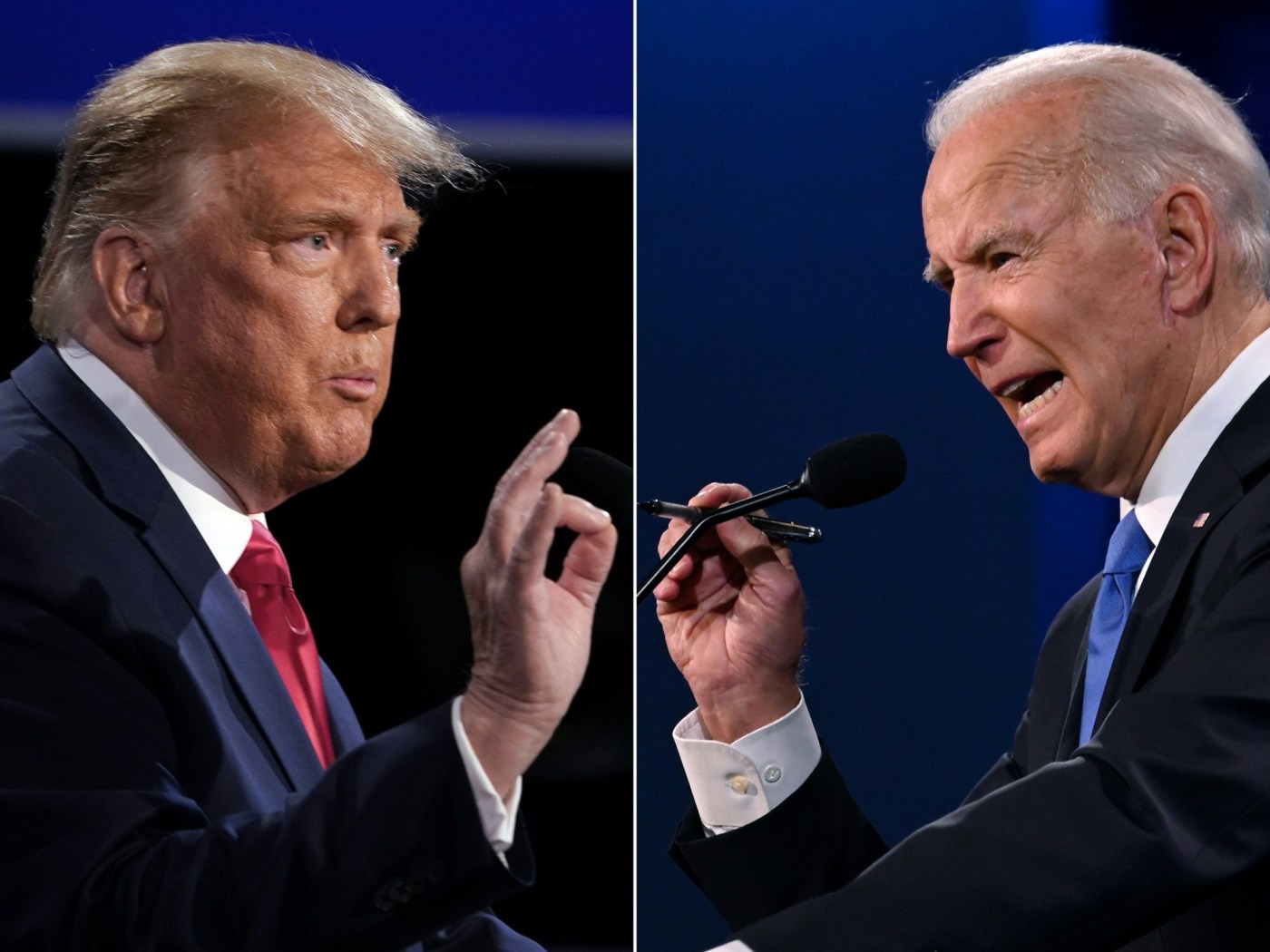
Andreas Kluth: U.S. exceptionalism is dead no matter who wins the election
A facile way to frame the future of American foreign policy is to set up two scenarios as a binary choice. If former President Donald Trump returns to the White House, the United States becomes isolationist. If President Joe Biden wins reelection, the U.S. remains broadly internationalist.
That framing neglects a change that may be less obvious but more consequential for other countries, a shift that will keep playing out no matter who wins in November: For the first time in its two-and-a-half centuries, the U.S. will stop looking at the world through the lens of its own exceptionalism, and behave as just another Great Power using its awe-inspiring might to serve a narrow self-interest.
The old notion that America is exceptional was there from the start. It inspired John Winthrop, as governor of the Massachusetts Bay Colony in 1630, to speak of a “city on a hill” and Ronald Reagan in 1980 to turn the same phrase into a “shining city upon a hill.”
Over the years, this exceptionalism took many forms, from Manifest Destiny to racist “Anglo-Saxonism,” from a belief in the country’s unique theological calling to pride in its civic virtues. One way or another, though, most policy makers agreed with Herman Melville: “We Americans are the peculiar, chosen people — the Israel of our time; we bear the ark of the liberties of the world … The rest of the nations must soon be in our rear. We are the pioneers of the world, the advance guard.”
This shared sense of exceptionalism was also the common factor in the country’s two otherwise contradictory foreign-policy traditions, as Henry Kissinger pointed out in 1994, at a moment of unipolar American primacy. Isolationists saw the U.S. as perfecting its democracy at home and shining its light as a “beacon” to the rest of humanity but otherwise leaving the world alone. Internationalists understood exceptionalism as an obligation to spread American values around the world as “crusaders” or “missionaries.”
Each tradition has at different times served America and the world well and also ill. Until the Spanish-American war, isolationism largely kept the U.S. out of the old world’s balance-of-power machinations and imperialist adventurism; that was good. Between the two World Wars, an isolationist U.S. abdicated its responsibility when it could have preserved international order; that was bad.
After World War II, an internationalist and quasi-messianic U.S. built and policed a new world order, at least in much of the non-communist or “free” world. Good. In time, American confidence became hubris, as when George W. Bush proclaimed in 2002 that “today, humanity holds in its hands the opportunity to further freedom’s triumph,” and promised that “the United States welcomes our responsibility to lead in this great mission.” A few months later, he gave orders for a misguided and disastrous war in Iraq.
Whether shining as a beacon or conquering and preaching as a crusader, U.S. leaders largely agreed that America’s self-government — its democracy — was exceptional. Far from complete, especially before the civil-rights movement, it seemed to be forever climbing toward its destiny on that shining hill, a work in progress that showcased a narrative of freedom to people everywhere. And that’s what has changed.
The eschatology of American democracy first became dubious during the first Trump term, especially with the attack on the Capitol on Jan. 6, 2021. If the country had subsequently rallied in defense of its republican ideals — during the congressional hearings on 1/6, for example — the next chapter could have reaffirmed the narrative of perennial self-correction. That didn’t happen.
Instead, the Big Lie (that the last election was “stolen” from Trump) lives on, alongside other conspiracy theories. Preparations are underway to use a second Trump turn to weaponize the Justice Department against political enemies, even as Trump’s minions pretend that this has already happened under Biden. The neutrality of more than one Supreme Court justice is in doubt. Left and right alike, for different reasons, fear that the rule of right is yielding to a rule of might, and are losing faith in America’s elections, institutions and exceptional virtue. The film that captures the mood this year is Civil War, a haunting tale of Americans killing one another for no fathomable reason.
The outside world is paying incredibly close attention. Foreigners certainly no longer see the U.S. as a beacon of republicanism. Nor would they, whether allies or adversaries, tolerate any more American crusading. The Pew Research Center surveyed people in 34 countries, and found that an average of 69% had no confidence in Trump doing the right thing in world affairs; a still unflattering plurality of 46% said the same about Biden.
What arguably matters even more is what Americans believe nowadays. I doubt many beyond the capital’s Beltway would still subscribe to a phrase that former secretary of state Madeleine Albright coined and many Republicans and Democrats subsequently adopted, which sees America as the “indispensable” nation. Exceptionalism in its old form is dead, and with it notions about an American role as either a beacon or crusader.
What will replace it? The new approach to world affairs would resemble the one Kissinger studied as a scholar and tried to practice as America’s top diplomat. It leaves less space for idealism and more for realism, places less emphasis on values and more on interests. It’s neither inherently good nor self-evidently bad, just very different in outcome for almost every other country.
For example, both Ukraine, which is defending its national sovereignty and survival against Russia, and Taiwan, which may yet have to fight for its democracy and freedom against mainland China, have been called “the new West Berlin.” But will any future U.S. president risk war, including the nuclear kind, by pledging that “Ich bin ein Kyiver”?
An America that refuses to be a crusader will also reject any role as White Knight. And a country that doesn’t see itself as a beacon will care less about acting high-minded toward others. U.S. economic policy is already turning protectionist and nationalist. It will also become more transactional, pocketing deals that leaders can sell to their base at home rather than upholding lofty principles of global governance.
American hegemony in guarding the liberal — or “rules-based” — international order will die from lack of interest long before expiring from lack of resources. Washington’s support for international law, from the United Nations to The Hague, will fade.
American leaders will instead approach their foreign counterparts much as the Austrian statesman Prince Metternich (a Kissinger favorite) dealt with Europe’s monarchs in the 19th century. They’ll try to arrange a new balance of power and to negotiate spheres of influence, even at the expense of friendly but small nations. Beijing already speaks this language in the South China Sea, and Moscow in eastern Europe. In the coming years as in Metternich’s time, that style of diplomacy will occasionally use war as an instrument, albeit (one hopes) the limited kind.
Some students of American statecraft will mourn this shift. Others, irate about the hypocrisy that often accompanied both the beacon and the crusader personas, will shrug and say good riddance. In a sense, the world, inside America and beyond, is merely reverting to the historical norm, in which values mattered less and power more. America’s friends and foes alike should be aware.
Andreas Kluth is a Bloomberg Opinion columnist covering U.S. diplomacy, national security and geopolitics. Previously, he was editor-in-chief of Handelsblatt Global and a writer for the Economist.
Related Articles
Clive Crook: You don’t have to love Trump to fear a partisan U.S. justice system
Bret Stephens: How capitalism went off the rails
Nolan Finley: Treat all gun violators the same as Hunter Biden
Thomas Friedman: American leaders should stop debasing themselves on Israel
Tyler Cowen: The real government conspiracy isn’t about UFOs

